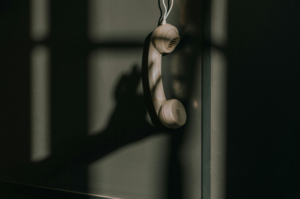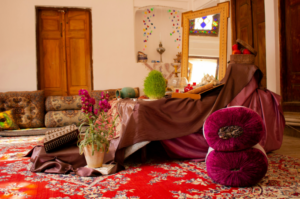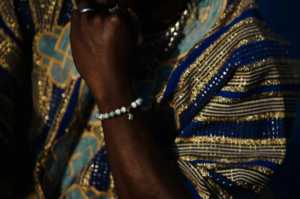![]()
With the scathing chill of December always comes the two mothers I own. The first one toils to turn her prim fingers into snappy bites of dessert in near perfection of our flat in Reykjavik.
She, without mind, had grown a body averse to all the comfort of this town—from her smooth and hassle free literary career to our squared flat, stuffed with the African artifacts she collects from her exotic travels. They rest on the wall shelves, kitchen tops, and window ledges. She always makes as if they were about to choke her, to the extent that she’d spending entire afternoons hurling them away from their bases and screaming:
“Stop looking at me! You all think there are no problems in this world? Sitting there all sated and fine. Stop your stares. Life can never be perfect.”
When she calmed down, she would step over the disarray to nurse a drink in the kitchen. But she would always find her way back into to living room to clear away the objects scattered on the floor, after which, muttering inaudibly to herself, she would cart her sapped being to the room where her typewriter rested close to the window, facing an immaculate impression of Mount Esja.
***
The second mother, however, is someone I do not know but wish that I could be more familiar with. She is a bright woman who slips seamlessly into the cacophonous go about of Christmas time in Nnewi, with an impossibly perfect sense of self.
Our house in Nnewi was a one time sinking mud house. In a rare mother-daughter moment, she told me the story about how she transformed it into a spacious three story building painted in the oddest color of brown. Like red brown, or brown red. Like mud paint.
The airport car would drive into the sparse compound dominated by women wrapped in conversation. Smoke escaped from their vast cooking pots. They sorted ingredients beneath the mango two trees with branches fluttering in the harmattan wind.
My mother would bid a hearty reply to all their frenetic welcomes and smuggle herself into the house, up to her room.
The house was usually stuffed with months old cobwebs and dust thick around the window panes. Some of the women would enter the house to mop, and wipe, and sweep, and chase away the clusters of our accumulated abandonment.
My mother would pullout musty boxes containing her Georges, Hollandaises, kiri-kiri stars, and the rest of her best wrappers and lace blouses.
She would put one on, with the fluidity of entering an oiled skin, check the foggy mirror to puff up the shoulders, or make sure the bright yards of fabric sits well on her slim waist.
She would carry with her a pressed head gear, to be framed around her head by one of the women beneath the trees.
***
The women would fondly hail her onye ne de akwukwo nke ezigbo as she distributed gifts from the two weeks shopping she’d done in Lagos, along with the many things we no longer needed in Reykjavik, but saved for people who might be able to use them here.
In Nnewi, my mother cooks. She actually spends hours with the women, or alone in the house kitchen, making something oily and tasty. A relief from the many canned or boxed meals back home.
She makes me sit between her laps, to have my hair braided by her coconut oiled fingers; this would be the only time I relish her love in a strange way. With every pick of my hair interlaced with a thin slice of attachment, we would talk, and laugh, mostly about our most amusing country experiences, and with intention, we would momentarily expunge the days in the iciness of Reykjavik.
We take trips to Ozubulu, our eyes eating up the eastern sights of Eastern Nigeria, especially the markets teeming with people who, as mother explained, have returned home from Onitsha and faraway places like Kano, Lagos, Kwara, Port-harcourt and literally every other state in the country. They are all here trying to get the freshest farm produce at prices many times lower than what they would get it in the city.
***
I have tried many times to pick out and store every detail of these trips, so they can last me through the coming year.
But when I shut my eyes at night after her rants and terrifying breakouts, all that comes back are: the indelible taste of Okpa, the stripes of color in the markets we only ever pass through but never enter. Sometimes I might remember a rosy faced Okporoko seller beckoning on us to patronize her hefty mound of stock fish.
“Unu hapi kirisimasi, come and buy. Aunty, you will not see this kind in Lagos o. I will sell it well for you.”
I wish more memories would come back to cart me (and possibly her) away from the clusters of her (our) despair.
********
Post image by Photo rawpixel.com via Unsplash
********
About the Author:

Nelson C.J is a fiction, prose-poetry, and nonfiction writer whose works have been published on a number of literary websites and journals including the kalahari review.com, Tuck magazine, WAW fiction blog, Africanwriter. Com and recently the TSSF journal.









COMMENTS -
Reader Interactions